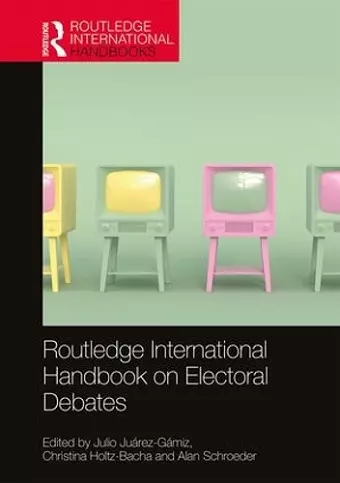Routledge International Handbook on Electoral Debates
A Comparative Perspective on Political Communication
Christina Holtz-Bacha editor Alan Schroeder editor Julio Juárez-Gámiz editor
Format:Hardback
Publisher:Taylor & Francis Ltd
Published:26th May '20
Currently unavailable, and unfortunately no date known when it will be back
This hardback is available in another edition too:
- Paperback£45.99(9781032172620)

This comprehensive handbook explores electoral debates through a comparative lens, offering insights from scholars and practitioners worldwide. The Routledge International Handbook on Electoral Debates sets a new research agenda.
The Routledge International Handbook on Electoral Debates is a pioneering work that comprehensively maps the scholarship surrounding electoral debates from a comparative perspective. It features contributions from leading scholars and practitioners who introduce a cohesive theoretical and conceptual framework aimed at understanding the dynamics of electoral debates. This handbook also highlights promising avenues for future research on how electoral debates have evolved over time, emphasizing the importance of contextual factors that shape these discussions.
In addition to theoretical insights, the Routledge International Handbook on Electoral Debates offers a detailed examination of practical considerations drawn from diverse country-level experiences. It identifies three key indicators for analyzing electoral debates: the level of a country's experience with such debates, the geopolitical characteristics that influence political dynamics, and the overall democratic stability and competitiveness of electoral systems. By incorporating examples from regions including the Americas, Europe, Africa, the Middle East, Asia, and Oceania, the handbook enriches the discourse on electoral debates.
Each chapter of the Routledge International Handbook on Electoral Debates delves into various aspects, such as the historical relationships between traditional debate formats and their emergence, critiques of the role of debates in democracy, and assessments of new theoretical resources in light of local experiences. It also discusses the changing media landscape and its impact on political communication, providing a forward-looking analysis of the future challenges that electoral debates may face.
'Those planning to produce or research political debates will welcome a comprehensive update outlining the happenings in the International Debate arena. This volume offers practical insights for those engaging political debates as part of applied Democracy.'
Allan Louden, Department Chair and Professor of Communications, Wake Forest University
'The Handbook illustrates the exponential growth of political debates worldwide over the past twenty years. Regardless of world region, political structure, or cultural differences, there are universal rules, impacts, and challenges. There are also significant differences influenced by a variety of factors. The Handbook fills a major void in the literature for anyone teaching or studying political debates and for anyone advising debate sponsors.'
Diana B. Carlin, Professor Emerita, Saint Louis University
'As this remarkably fine Handbook documents, candidate debates are now central to election campaigns in most democracies world-wide. Their organisation and conduct are influenced by underlying political systems and cultures but have evolved over time due largely to the fragmentation of party systems and multiplication of news channels. Head-to-head two-person duels have consequently often been supplemented or replaced by multi-party programmes. Many differences emerge in the book’s 28 national chapters; how regulated (if at all), the offices requiring debates, whether mandatory or not, participation eligibility, number and sequencing of debates, debate formats, moderators (who and in what roles), and any audience involvement. Certain near-universal features, despite these differences, are particularly important. Leader debates typically attract very large audiences, including many normally only marginally attentive voters. Sometimes viewers have expressed disappointment after the contests, complaining that debaters’ comments had been overly scripted, cautious or repetitive. Nevertheless, significant effects on knowledge gain about issues and policies have been found from research when conducted - and more so among initially less politically involved voters. As the editors rightly conclude, when this is done fairly, debates can focus voters’ attention on a combination of public policy, issues and personality traits.'
Jay Blumler, Emeritus Professor of Public Communication, Leeds University
ISBN: 9780367355036
Dimensions: unknown
Weight: 560g
312 pages